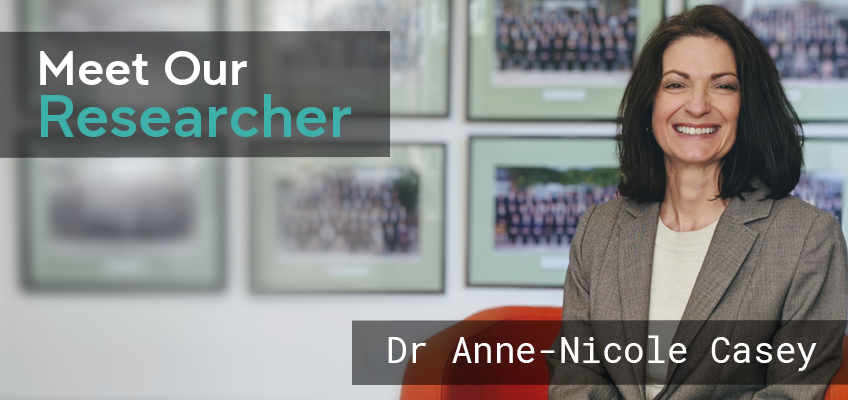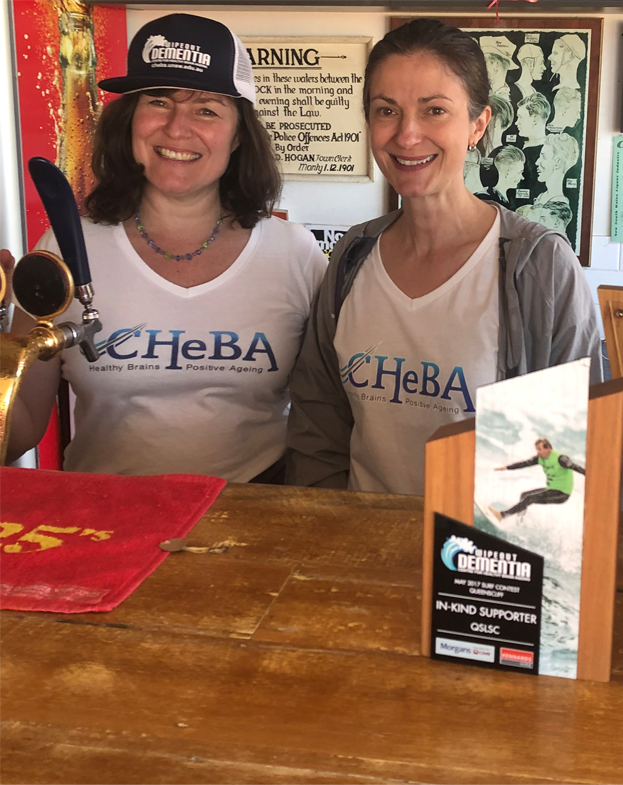26 May 2020

Providing individuals and policymakers with valid information regarding the impact social relationships have on successful ageing is the ultimate hope Dr Anne-Nicole Casey has for her research. There is a wealth of evidence to suggest that maintaining positive social relationships, particularly during challenging periods like the current global pandemic, can help to support cognitive and emotional well-being. According to Dr Casey it is our family and friends that sustain us; a sentiment that would resonate strongly with the community at this time and remains applicable despite physical distancing.
How did you get into researching the ageing brain?
My interest in psychology and brain ageing grew over several years from training and volunteering as a behavioural observer at Taronga Conservation Society Australia. That experience was transformative for me and I was lucky enough to have the opportunity to retrain and work towards becoming a gerontologist. My first job after graduation was at the Dementia Centre for Research Collaboration working with Professor Henry Brodaty.
Did you experience a ‘defining moment’ which led you to this field?
I suppose many different life experiences contributed to my interest in this field. My mother was a Registered Nurse who worked in hospitals and primary care. My curiosity for healthy brain ageing developed from a genuine affinity with older adults, particularly people in our local community, my grandparents and their immediate friends. My grandmother developed Parkinson’s related dementia and was not properly diagnosed for quite a while. She eventually moved to residential care. Living in a small town, the resources and care options that our family encountered were limited to say the least. These and other experiences gave me some insight into how profoundly neurodegenerative conditions can affect people’s lives; the people living with the disease, their loved ones as well as their friends. Being part of the effort to learn how we can all keep our brains healthier for longer seemed the best way forward to me.
Do you have any personal interests or activities which are protective behaviours against cognitive decline?

My area of interest is social relationships and social networks, so, whilst I am an introvert by nature, I stay as socially connected as possible and seek solitude to recharge when needed. Ultimately, our family and friends are what sustain us. Our social relationships - and the relationships throughout our genetic history - start forming who we are as individuals and influence our brain health, before we are even born. There are so many social determinants that influence our health, such as access to good education and nutritious food, access to green space and clean air and water, a safe home environment and social relationships that support healthy behaviours such as exercise - as opposed to risky behaviours, that have a vastly negative impact on our health, like smoking or substance abuse. If your grandmother smoked during pregnancy you may have twice the risk of developing childhood asthma. Childhood poverty is associated with smaller hippocampal volumes and more cerebrovascular lesions. From my perspective, nearly everything about our brain function and brain health has to do with social relationships and is formed by the broader social community; it is all interrelated.
These factors motivate me to prioritise my own brain health. In terms of reducing risk of cognitive decline, I ensure regular contact with family and friends and colleagues, aim to exercise daily and maintain a healthy diet. I find that using an app to assist with managing a positive exercise and diet regime is very helpful. Sleep is also extremely important for consolidating memory and for maintaining a healthy immune system. There is no denying that it is a difficult time for everyone at the moment. We are all experiencing unique challenges and oftentimes increased feelings of anxiety, stress or upset can affect our sleep patterns. As such, I try to establish a good sleep routine by being consistent with the time I go to bed and get up, switching off electronic devices at least half an hour before bed and avoiding caffeine in the late afternoon; albeit not always successfully.
From my perspective, nearly everything about our brain function and brain health has to do with social relationships and is formed by the broader social community; it is all interrelated.
What are you currently researching?
Last year, our team published a systematic review and meta-analysis looking into associations between social engagement, loneliness, and risk of dementia. Our analysis of all the existing evidence to date indicated that having a poor social network and lacking social support increased dementia risk and that good social engagement was somewhat protective against dementia. However, it was still unclear whether social networks influence cognitive ability, whether cognitive ability influences social networks, or whether they influence each another. I have just finished a study of longitudinal associations between social networks and cognitive function in the Sydney Memory and Ageing Study. Participants reported how many friends and family they contacted regularly, which indicated the size of their network of close relationships. Participants also completed comprehensive neuropsychological assessments of their cognitive function, which provided a picture of their ability in several areas including attention and processing speed, executive function, visuospatial ability, and different aspects of memory. Our team then investigated whether a person’s cognitive ability influenced how many friends and family members they regularly kept in contact with over time, and whether how many friends and family a person kept in contact with influenced a person’s cognitive ability over time. After accounting for other potentially influential factors such as age, gender, years of education and symptoms of depression, our research indicated that cognitive ability and the number of close relationships did not influence each other in a significant way for the people in this study. However, further investigation suggested two important findings. Firstly, that the quality, rather than the quantity, of relationships was associated with cognitive ability over time. Secondly, that some people had social networks that grew in size dramatically, some had networks that shrank dramatically, and some had networks that stayed relatively stable over time. This was surprising because it is often assumed that we gradually begin to focus on fewer, more meaningful relationships as we age so that our social networks gradually shrink. Identifying how cognitive ability and social networks influence one another may require longer follow-up times and greater focus on the quality, diversity, and meaningfulness of relationships.
Why is your research important?
The weight of existing research evidence indicates that our social relationships affect many aspects of our physical, emotional and cognitive health throughout our life. Social relationships are an integral part of our lifestyle and like other lifestyle factors aspects of social relationships may be modifiable. As a very broad example, maintaining a nutrient poor diet or experiencing depression during pregnancy can negatively impact brain development of the child, both in the womb and in early childhood. Additionally, the adults interacting with us during childhood significantly influence how we interact with others, how we respond emotionally, how we interpret behaviour and even how we shape our individual patterns of behaviour. Meta-analytic studies looking into whether social engagement and loneliness influence cognitive function indicate that yes, social relationships impact your risk of developing dementia in older age. People with larger, more diverse social networks and better-quality relationships, particularly friendships, seem to have better cognition for longer. Our social relationships have a significant impact on our learnt behaviours and cognitive decline in older age. As part of the CHeBA team, my research in this area is important because it will help clarify which aspects of our social relationships are more or less influential to our brain health as we age and how our individual characteristics may play a role. This information is of fundamental importance for designing effective social strategies to reduce dementia risk.
Meta-analytic studies indicate that social relationships impact your risk of developing dementia in older age.
What do you love about working for CHeBA?
It is extremely gratifying to be able to work in an area where our research may contribute to helping people stay healthier as they age. People make changes in their lifestyle to promote healthy brain ageing so that they can have a better quality of life and hopefully, they can enjoy having better relationships as well, which will benefit cognition in the long term. Being involved in generating the evidence base around both of those messages is highly rewarding. Personally, having the opportunity to work with brilliant and like-minded colleagues who are genuinely nice people is also a privilege. CHeBA is highly collaborative, there is a great collegial atmosphere and staff are very supportive of one another. Everyone helps out where they can and promotes not only their own research but each other’s. The sense that we are all working towards a common goal is unmistakable at CHeBA.
What is the ultimate hope you have for your research?
I hope we find evidence to help individuals to make informed decisions about their own health and social relationships. My secondary hope is to provide research outcomes that support the decision-making of policymakers. When trying to put together dementia reduction strategies there is a lot of information to consider and consolidate and hopefully, we can add value to this process. There is significant momentum now to help older adults globally become more socially integrated and reduce loneliness, which can also reduce the risk of dementia. We are all working toward the goal at the same time.
This interview was undertaken during the COVID-19 self-isolation period. Dr Casey found that going for walks around her neighbourhood and having video calls with her family and friends supported her mental resilience and kept her feeling socially connected while physically isolated.
Donations are fundamental for critical research to continue following COVID-19.
If you would like to discuss supporting Dr Casey’s work specifically, or would like information
on leaving a legacy via a Gift in your Will, please contact h.douglass@unsw.edu.au.

Dr Anne-Nicole Casey is a Postdoctoral Research Fellow at the Centre for Healthy Brain Ageing (CHeBA). Her research has explored cross-sectional and longitudinal associations between self-reported social networks and cognitive functioning using data from the Sydney Memory and Ageing Study. Prior to joining CHeBA, Dr Casey was a Researcher at the Dementia Centre for Research Collaboration at UNSW Sydney where she participated in projects including a cluster-randomised controlled trial of humour therapy in residential aged care (RACF), exploration of friendships and social networks of people living with dementia in RACF and knowledge translation of outcomes from a dementia-focused continuing professional development program for General Practitioners and Practice Nurses to promote timely diagnosis of dementia in primary care settings.
